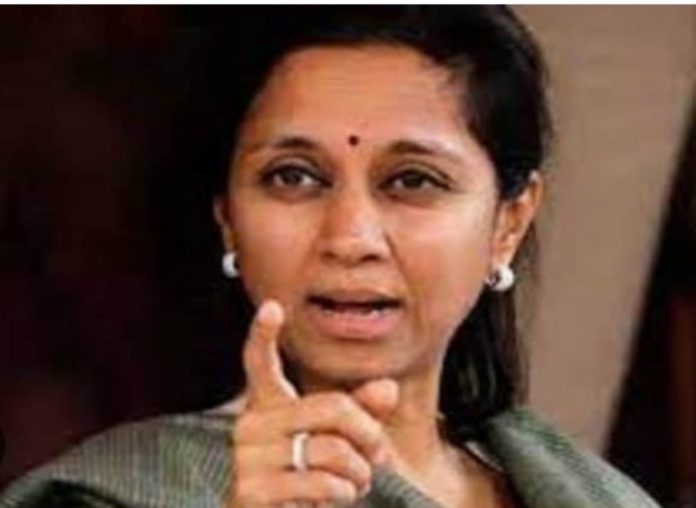
Dr. According to Babasaheb Ambedkar, “Democracy is not merely a form of government… it is an attitude of respect for the countrymen.”
In the recently held winter session of Parliament, the Modi government suspended a total of 146 MPs. Their only demand was that Parliament should discuss the serious issues of security and farmers. Restrictions on the export of wheat, rice and sugar were the main issue among the farmers. Due to this policy of the government, the export of agricultural products has decreased drastically.
The way the bills were introduced and unilaterally passed after suspending the majority of MPs from the opposition party, it is clear that the government is not interested in any constructive discussion.
Each of these bills was a gradual erosion of the fragile fabric of our democracy. Democracy was shackled by karal claws.
First of all let us consider the ‘Chief Election Commissioner and Other Election Commissioners Bill 2023’… This Bill is intended to curtail the autonomy of the Election Commission and bring the Commission under the heel of the Central Government.
In defiance of the Supreme Court’s directives, the seat of the Chief Justice in the selection committee was given to a Union Minister appointed by the Prime Minister to gain unilateral control over the Commission’s selection process. The court had ordered that the committee appointing the Election Commissioner should include the Prime Minister, the Leader of the Opposition and the Chief Justice.
Moreover, a provision was made to suggest the name of the Election Commissioner even in the absence of all the members of the selection committee. This provision is a permanent compromise on the integrity, credibility and autonomy of the committee.
If it is clear that two out of three members will always be in favor of the government, the selection process becomes completely anti-democratic.
Former Election Commissioner Ashok Lavasa in a recent article in ‘The Great Indian Manthan’ said, “Public institutions are expected to be run with integrity and integrity. If it’s not done that way, citizens lose faith in these institutions (and, by extension, the democratic system). With the passing of these bills, one thing is clear that the Bharatiya Janata Party will not respect the sanctity of any public institution and it is a dire threat to our parliamentary democracy.
The second point is the so-called revolutionary reforms in the ‘colonial’ criminal laws. Many promises were made that these reforms would relieve the case-burdened judiciary, simplify the complex legal process, make life easier for the common man and bring the laws into line with modern times.
But in reality these claims turned out to be hollow. Most of the clauses were merely renumbered, old clauses were reworded and that too in more ambiguous language.
The real magic is in the pretense of some grand reform. The rest of the reforms are mere sleight of hand. There is no chance of any improvement in the judiciary. These reforms are moving away from the principle of ‘bail is the rule, not the exception’.
According to the new criminal laws, the period of police custody has been allowed to be increased from 15 days to 90 days (depending on the nature of the crime). Obviously, the accused will have to remain in police custody for longer and the possibility of tampering with evidence will be greater.
Shackles have been made mandatory not only during arrest, but also when the accused are produced in court. Ambiguous language has been used to deliberately enhance the powers of the police in a manner that is convenient for political leaders.
For example – spreading misleading information, undermining the sovereignty, integrity and unity of the country has been criminalized.
The Judiciary has been tasked with speeding up court hearings without addressing the shortage of manpower in the Judiciary.
The Ministry of Law and Justice has also clarified while replying to the parliamentary question that it is necessary to solve the issue of manpower and facilities.
Third is the Press and Registration of Periodicals Bill, 2023. This is a bill that curtails freedom of the press in the name of public safety. It is a tool to suppress dissent.
This is because it mandates the BJP government’s prior approval for the re-publication of foreign publications and detains those convicted of ‘terrorist acts’ or ‘illegal activities’ (mostly wrongly and pending appeal) from publishing magazines. The government has got the right to be unnecessarily aggressive.
With the power to pass any bill and therefore the audacity to impose extreme control like a dictator, no one can now challenge him, let alone show it.
Over the years, our various fundamental rights have come under so many attacks that perhaps the Telecommunications Bill, 2023 should not come as much of a surprise to us. This Bill is a good example of what a Bill for License Raj should look like. The bill mandates licenses for any digital entity that transmits all types of messages, from images to videos.
Under the guise of ‘public safety’, the law gives the government broad powers to seize or suspend telecommunications services. Under authoritarian governments, the bill infringes on basic rights such as freedom of speech, expression and privacy in ways such as mandatory biometric verification for users of social media and registration of journalists on telecommunications services. Restrictions. Welcome to this ‘new India’.
Other MPs, including myself, were suspended for demanding a discussion on the security breach in Parliament. And the BJP MPs who entered the Parliament in such a manner did not face any action or face any consequences. The final milestone is in action. The annihilation of the opposition from Parliament and the hasty passage of bills in an ‘Orwellian’ manner will be a dark chapter in the history of Indian democracy.
And when all this is happening, when unemployment is at historic highs, consumer spending is at historic lows, the business class is migrating in droves, and the plight of the common man seems unheeded…
India today is facing unprecedented social, economic and geopolitical problems and we urgently need a parliament to discuss and resolve them. We really want to help the India Alliance party government to take the country to new heights. So every time the BJP government tries to strangle our MPs and Parliament, it is the national interest that is harmed, not anyone else. As former Vice President of India Hamid Ansari said (in Penguin Publishing’s The Great Indian Churn), “A dysfunctional parliament can be the first step to oblivion… and can seem to confirm the claim that the country is becoming the ‘world’s largest liberal democracy’.
Like every patriot, I pray that we can remain the greatest liberal democracy in the world. As Mahatma Gandhi said, “In democracy there is no loyalty to the individual. You should be loyal or loyal to institutions.”
(The author is a Nationalist Congress MP.)





